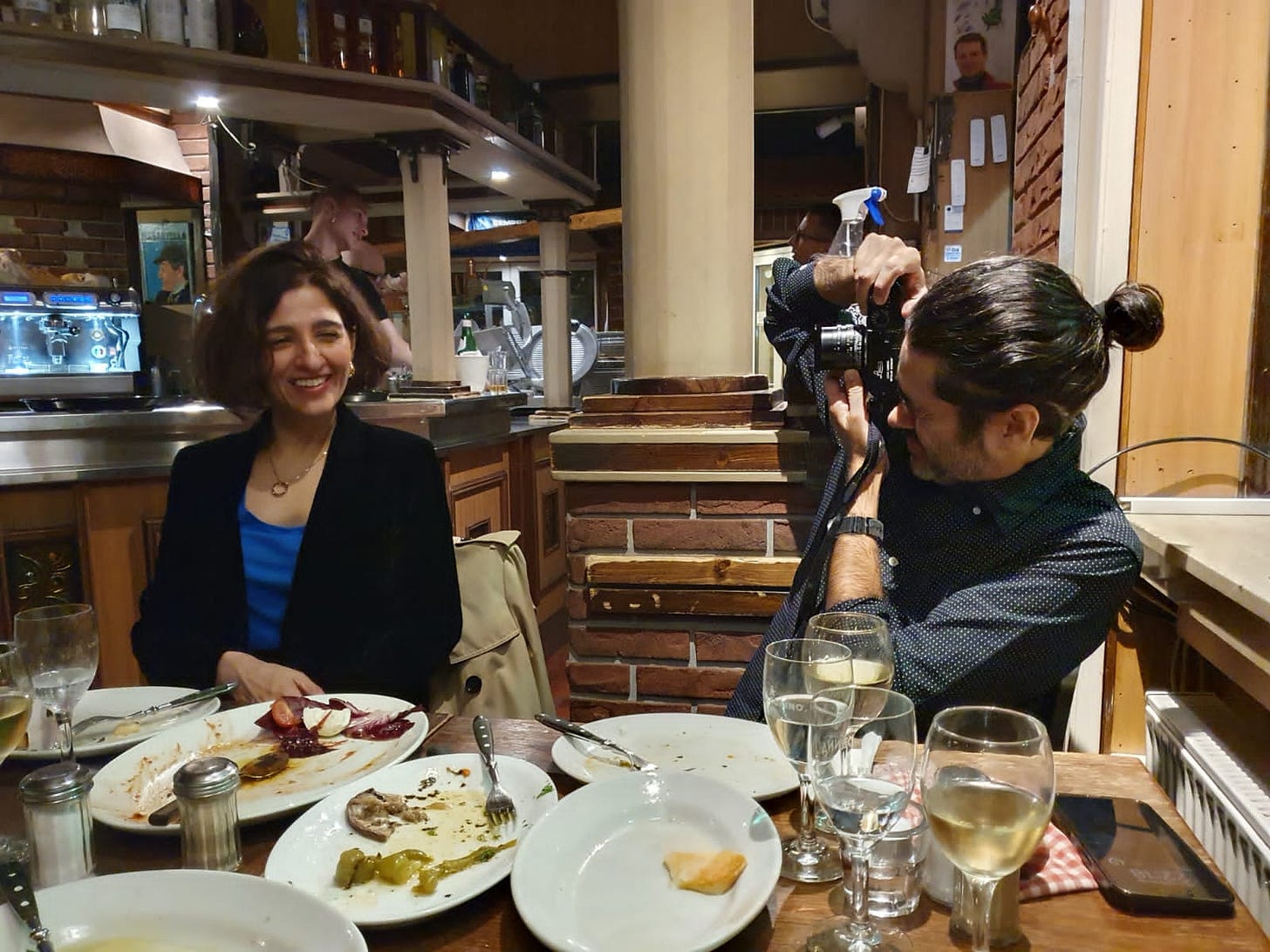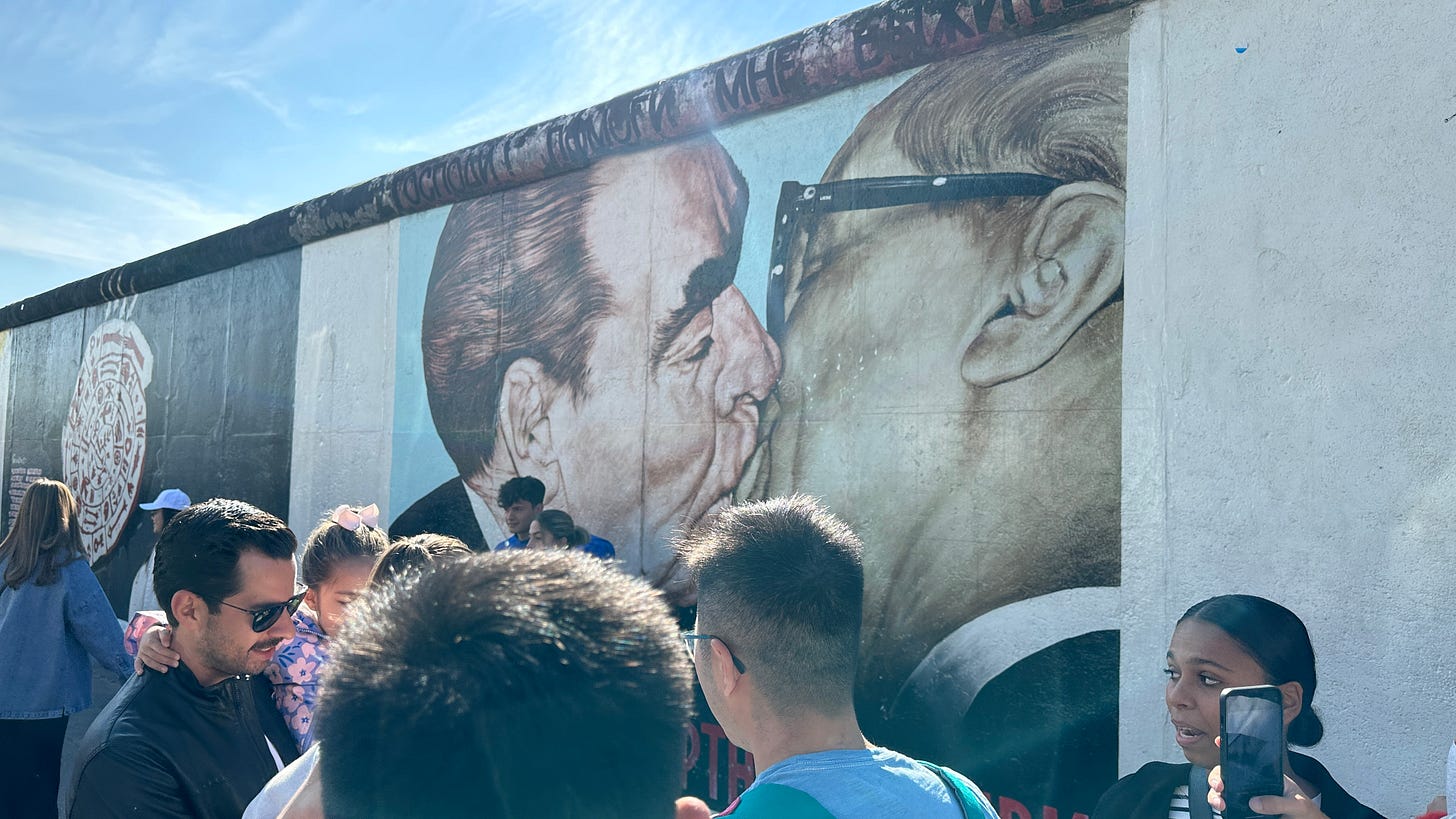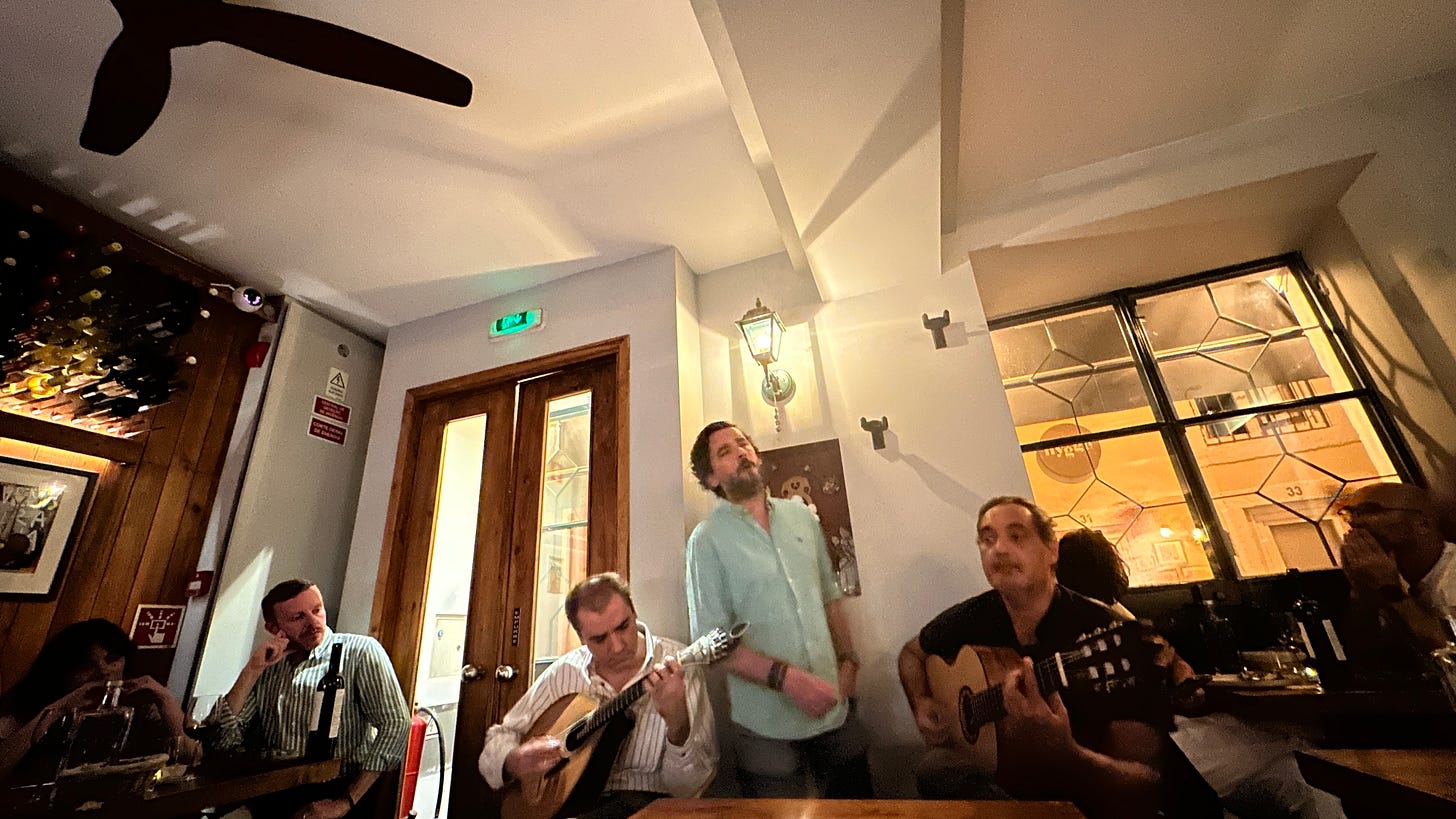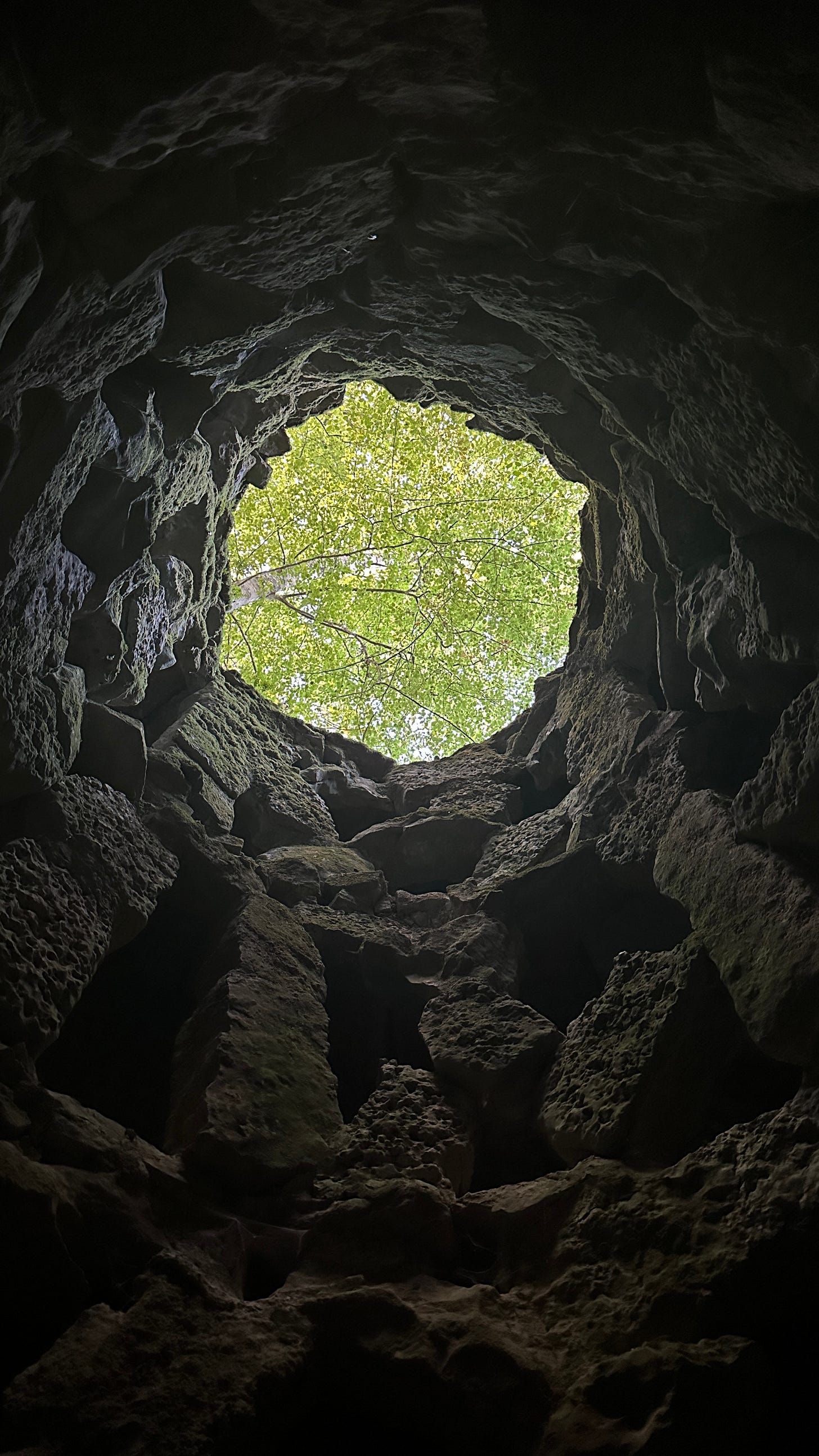Yet Untitled 076 - Descending into Grottos
Thinking about how to think about the past
Dearest Yet Untitler,
Technically this is still a holiday dispatch, but I’m not calling it that because I’m writing it while hurtling out of my holiday on a plane, speeding back to my ‘everyday’ life.
I’ve been thinking about my state of mind while being on holiday. It occurred to me that I could describe it as a past-less and future-less way of being. Is this even possible? Isn’t the holiday relief I’m feeling also a function of having been extremely busy in the recent past? And also a function of the knowledge that I’m not going to be as busy in the immediate future?
Yet, I experienced the past few days as somewhat dissociated from all that has been and all that will be. Of course, this is an illusion - but it’s one that I’m grateful for. Perhaps what I really felt was a lack of anxiety about the past and the future. I also didn’t go looking - I’m sure I would have found it, If I had tried.
What stopped me from sabotaging my peace from such brooding? The ol’ vacation state of mind, checking out from all cares and concerns had something to do with it. Also, the immediacy and newness of everything I saw in the surroundings contributed. As C.P. Cavafy says in his poem Ithaca
May there be many summer mornings when, with what pleasure, what joy, you enter harbors you’re seeing for the first time; may you stop at Phoenician trading stations to buy fine things, mother of pearl and coral, amber and ebony, sensual perfume of every kind— as many sensual perfumes as you can…
But that was my brain on holiday. I did see a few things that got me thinking about the past and dealing with it - not my own, but the Past per sé. Please note that what follows are my own uneducated observations and by no means a nuanced cultural commentary. It’s just what my 20,000 steps-a-day body and brain took in and processed over good wine, good food and good sleep over the past week.
Berlin and the Past
The Germans keep the past square in their sight. It’s not swept away into a corner of some suburb where you’re not likely to notice - it’s bang in the centre of town. Checkpoint Charlie, the remnants of the wall, the ‘kill zone/death strip’ where you would have been decimated by automatic machine gun fire if you stepped across the wall, they are all there - present and in plain sight to be processed by one and all.
I feel that eventually this processing has yielded works of art that are both aesthetically pleasing and loaded with meaning. The East Side Gallery - which could have just been a long, decrepit wall covered in graffiti - is, to me, a prime example. The Kill Zone behind it is now an idyllic strip of grass and concrete between the remnants of the wall and a scenic river. And the wall is covered with art full of messages about peace (and climate change, more on that later).
Lisbon and Fado
We lucked out with a traditional Fado performance in Lisbon. Our hotel arranged a booking at a lovely traditional Portuguese restaurant run by (unknown to us) one of the bright stars of Fado culture there. 30 mintues into our main course, the lights dimmed, and right there - Rodrigo Costa Felix, accompanied by some minstrel-angel incarnate on the Portuguese 12 sting guitar, regaled us with some powerful traditional Fado singing.
Vani and I did not know the language, nor the context - but our amazing hotel concierge rightly felt that it wouldn’t matter so much and that we’d be in for a dose of the vibe anyhow.
It was a fantastic experience.
The concierge had called ahead and triple underlined that we were vegetarians, and they management had gone to great lengths of prepare us a good meal. Whatever gaps remained were more than filled in by the great wine.
What struck me over and above the musicality of the performance was the posture of the singers - upright, proud; as if they were about to start dancing at any moment. There was a much potential energy all stored up, waiting to be released in movement but instead being released in song. I had no idea what the songs were about, but they were sung with honesty, and mostly with eyes closed.
Later, a friend explained to me that at the heart of Fado is Saudade - a concept related to a strong nostalgia about the past. In fact - my friend had a very strong, negative response to Fado. Here’s part of the conversation below:
P: I strongly dislike fado. Not the craft of it. But I'm at odds with the whole concept of 'saudades' which fado strongly embodies. In its most simple form saudades = nostalgia; not much wrong with that. In its deeper true sense its longing/feeling of loss / grief and an overall sense of incompleteness. Scratching a bit deeper, it's the feeling of all the above but for something that you actually didn't ever have but thought you might have had or could have achieved. It's this that sits uncomfortably with me. You miss what you had and now you don't. Not for the maybes and the ifs…
The conversation continued, going to some interesting places:
:-)
As you can see, the seed of this week’s installment was born in this WhatsApp conversation.
Bullet Journaling while on holiday
I’ve spoken about my practice of Bullet Journaling often in this newsletter. See this edition:
Yet Untitled 038 - Three Practices
Welcome back! I hope you’ve had a good week. I’ve been busy, carrying on but mindfully, thanks to a refresher course in Bullet Journaling I opted into last week. It’s been really fantastic. I don’t know how many of you are familiar with Bullet Journaling (or - BuJo). It’s been defined as a mindfulness practice pretending to be an organization system and…
Ryder Carol, the founder of BuJo, describes Bullet Journaling as a practice to…
Track your Past
Order Your Present
Plan Your Future
During my vacation, I found myself stealing moments to sit with my bullet journal and record the events of the vacation days. It seemed an urge I could not quell. Seemingly past-less and future-less days can very easily vanish into thin air. These days we document everything via the photos on our mobile phones, but BuJo has always allowed me the space to reflect a little in the middle of life-that-is-rapidly-passing-by. This newsletter was born from the reflection afforded to me by Bullet Journaling, and also my Buddhist practice.
In Sintra, I saw many Grottoes. I learned that the nobility used to have a practice of descending into the darkness of these catacombs in order to reflect on things. The whole process of descending into darkness and emerging back into the light must have created the right circumstances for insight. What’s interesting to me is that they needed to do this in an age when the amount of distraction they encounter was an infinitesimal fraction of what we contend with in the age of Instagram. But they still did it.
This vibed with me. Writing this newsletter is perhaps my version of descending into a grotto.
Clearly, I have a need to process things I see. On vacation, I see clearly that the world loads us with information and feeling. I appreciate that the Germans do not stop at just the feeling - the sentimentality. Their practical anpproach of looking ant things squarely is far from cold; it opens the way for playfulness and art that is forward looking and optimistic.
Perhaps there’s an aspect to Fado that my friend and I have missed that too is forward-looking and optimistic. The human potential of the Fado singer - proud of their culture, standing tall and sharing of themselves isn’t lost on me. It made me care about them, brought us closer, because I’d be lying if I said that I lack sentimentality totally.
In Berlin…
…I saw red stains on the Berlin Brandenburg Gate while crossing it. My friend Michael told me that the defacement was done by the group Extinction Rebellion, as a wake up call about climate change.
The stain was red, stark, like blood. I was glad to see it. Despite my desire to be past-less and future-less on my vacation, there still was a future that I, we all, have to think about.
This shook me significantly.
There is a saying in my Buddhist practice:
If you want to understand the causes that existed in the past, look at the results as they are manifested in the present. And if you want to understand what results will be manifested in the future, look at the causes that exist in the present.
“The Opening of the Eyes,” The Writings of Nichiren Daishonin, vol. 1
I sit in the aircraft, having arrived here via this present reflection. I step into the future loaded with it. Part of it feels heavy but I also feel rich, fortunate for it.
As Cavafy says towards the end of “Ithaca”
Keep Ithaka always in your mind. Arriving there is what you’re destined for. But don’t hurry the journey at all. Better if it lasts for years, so you’re old by the time you reach the island, wealthy with all you’ve gained on the way, not expecting Ithaka to make you rich.
While travelling to Ithaca, while traveling in general - one will see things. I’d like to go the German way on this one - look at them squarely, and then act positively in some way.
Writing this newsletter is the first step. There’s more stuff to be done.
Thanks for listening. Drop me a line of you have more insight into anything I’ve spoken about in this edition. I’d love to hear from you.
Lots of love,
V








